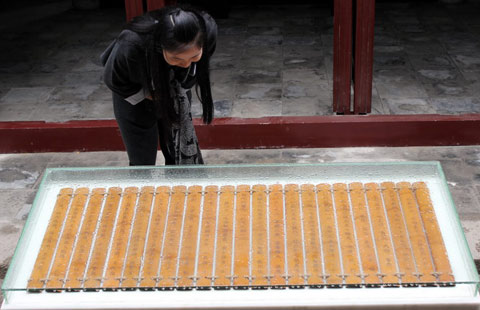Jiangsu plans more Confucius Classes
Updated: 2014-11-03 04:02
By WANG XIN and CANG WEI in Nanjing(China Daily)
|
||||||||
 |
|
A contestant tells a story about the twelve Chinese zodiac signs at the Chinese Bridge Chinese Proficiency Competition for Foreign Secondary School Students in Adelaide, Australia. WANG GUANLUN / XINHUA |
The educational department of East China's Jiangsu province will cooperate with foreign cities to set up 50 more Confucius Classes and three to five Confucius Institutes in two years, despite some criticism of the cultural project, according to the local government.
Ding Xiaochang, deputy director of the educational department, said that 200 volunteers and university teachers will be sent to Confucius Institutes and Classes from the province each year.
"We try to make the Confucius Institutes and Classes serve as a platform for educational, cultural and economic cooperation between China and other countries," Ding said. "The nonprofit program can forge friendships and mutual understanding if it is operated well."
According to the department, from 2008 to 2014, Jiangsu province established or helped set up 29 Confucius Institutes in Europe, North America and Africa.
Since 2004, when the first Confucius Institute was established in Uzbekistan, about 460 institutions and more than 710 Confucius Classrooms have been established in 123 countries and regions to teach the Chinese language and culture.
However, the establishment of Confucius Institutes and Classes has met with suspicion and criticism in some countries over the years, including some that have close ties with China.
In October, the educational department of Hunan province terminated its Confucius Institute program, which lasted less than five months, in Toronto, Canada, saying it had encountered unreasonable suspicions and unfair treatment.
Chen Li, a college teacher who worked for a Confucius Institute in Australia for one year, said the program should not be terminated because of ungrounded political criticism.
"People from different cultural backgrounds need to learn from each other to reach understanding," Chen said. "Simple termination or suspension of the Confucius Institutes will close the door to friendships between different countries."
To provide better teaching of Chinese culture and language, Jiangsu province is planning to compile new editions of textbooks for the Confucius Institutes, which will be easier for foreigners to understand.
The educational department also said that more emphasis will be placed on traditional Chinese culture instead of the popular and fashion cultures for learners to better understand the country.
It added that primary and middle school students, as well as college students, are welcomed to study in the province to communicate with residents and students.
In August, the provincial educational department launched a program that will grant 50,000 yuan ($8,180) to 90,000 yuan each year to qualified foreign students to attract 500,000 such students to study in Jiangsu every year.
Contact the writers through cangwei@chinadaily.com.cn
- Criticism of Confucius Institutes unfair
- Confucius Institutes thrive in Central Asia and Transcaucasia
- Confucius Institute welcomes Strasbourg visitors
- Ritual marks 2,565th birthday of Confucius
- 2,565th birthday of Confucius celebrated
- Ritual marks 2,565th birthday of Confucius
- Pupils recite Lunyu to mark birth anniversary of Confucius
- Cultural program marks 10 yrs of Confucius Institutes
- Confucius Institute Day celebrated in Rome
- China marks 2,565 anniversary of Confucius' birth
- Xi backs Confucius Institutes' development on anniversary

 NYC marathon held in chilly, windy weather
NYC marathon held in chilly, windy weather
 Volunteers aim high for APEC
Volunteers aim high for APEC
 Sports moments of the week (Oct 27 - Nov 2)
Sports moments of the week (Oct 27 - Nov 2)
 Zhuangyuan museum in Suzhou to open
Zhuangyuan museum in Suzhou to open
 Top 10 most visited video streaming sites in China
Top 10 most visited video streaming sites in China
 Traditional dresses add color to APEC
Traditional dresses add color to APEC
 A brief look at prison breaks in China
A brief look at prison breaks in China
 Chinese airline opens 1st Shanghai-Kathmandu route
Chinese airline opens 1st Shanghai-Kathmandu route
Most Viewed
Editor's Picks

|

|

|

|

|

|
Today's Top News
Wanted: 500,000 pilots for China aviation
Shaping Asia-Pacific's future
Xi stresses CPC's absolute leadership over army
Foreign TV shows online will need permission
Mass Ebola outbreak 'is unlikely'
S. Korea's plastic surgery paradise lost
China, US to meet on WMD nonproliferation
Danone bolsters China presence with $550m deal
US Weekly

|

|








